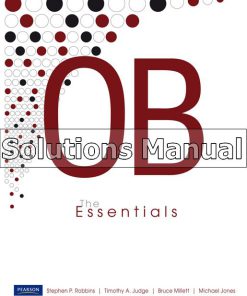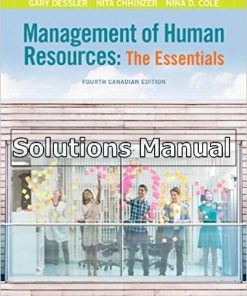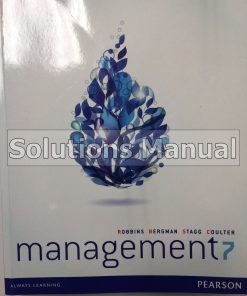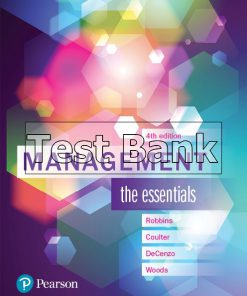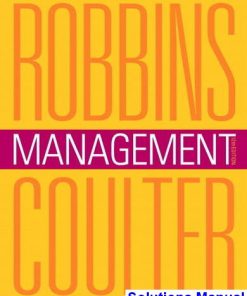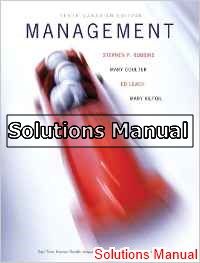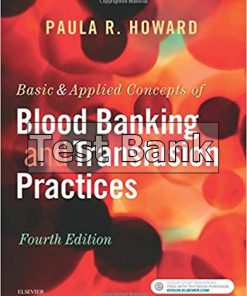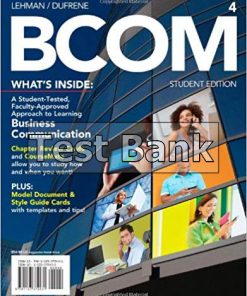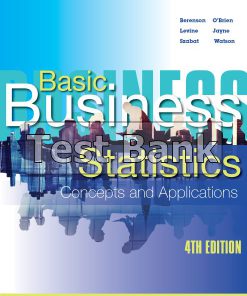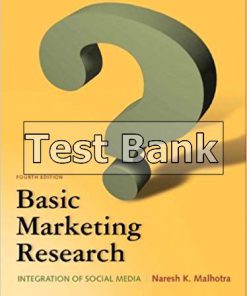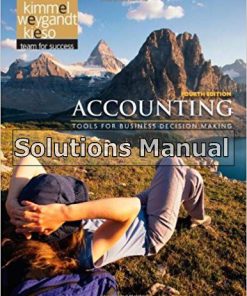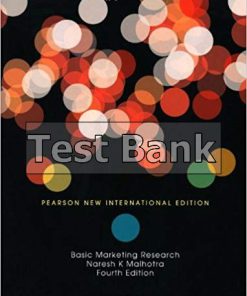Management The Essentials 4th Edition Robbins Solutions Manual
You may also like
-
$26.50
$50.00 -
$26.50
$50.00 -
$26.50
$50.00 -
$26.50
$50.00
This is completed downloadable of Management The Essentials 4th Edition Robbins Solutions Manual
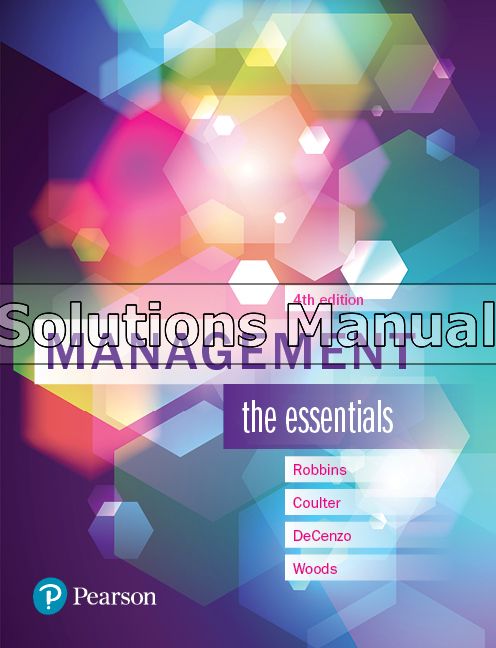
Product Details:
- ISBN-10 : 148861654X
- ISBN-13 : 978-1488616549
- Author:
The study guide includes a chapter outline, review questions, and study quizzes. Suggested answers to the review questions and quizzes are included.
Table of Content:
- Chapter 1 Managers and management
- Who are managers, and where do they work?
- What four characteristics do all organisations share?
- How are managers different from non-managerial employees?
- What titles do managers have?
- From the past to the present: 1588-1705-1911-Today
- What is management?
- What do managers do?
- What are the four management functions?
- What are management roles?
- What characteristics do managers need?
- Is the manager’s job universal?
- Why study management?
- A question of ethics
- What factors are reshaping and redefining management?
- Why are customers important to the manager’s job?
- Why is innovation important to the manager’s job?
- Why are ethics and social responsibility important to the manager’s job?
- Why are social media tools important to the manager’s job?
- Why is sustainability important to the manager’s job?
- Managing for sustainability | Making a positive impact
- Review
- Chapter summary
- Discussion questions
- Management skill builder | Becoming politically adept
- Case application 1—Google: Building a better boss
- Case application 2—Managing to create a better world
- Endnotes
- History module A brief history of management’s roots
- Early management (3000 BCE-1776)
- Behavioural approach (late 1700s-1950s)
- Classical approaches (1911-1947)
- Quantitative approach (1940s-1950s)
- Contemporary approaches (1960s-present)
- Choosing between management approaches
- Endnotes
- Chapter 2 The managerial environment
- What is the external environment of an organisation?
- What is the general environment of an organisation?
- What is the specific environment of an organisation?
- Managing for sustainability | Connecting up to do more with less
- How does the external environment affect managers?
- From the past to the present: 1981-1987-1991-today
- What is organisational culture, and why is it important?
- A question of ethics
- How does organisational culture affect managers?
- Managing for diversity |The paradox of diversity
- Review
- Chapter summary
- Discussion questions
- Management skill builder | Understanding culture
- Case application 1—Tragedy in fashion
- Case application 2—Getting a boost
- Endnotes
- Ethics and social responsibility module Managing socially responsible and ethical behaviour
- How do organisations define their social responsibilities?
- Should organisations be socially responsible?
- How can managers identify the ethical thing to do?
- What factors influence ethical and unethical behaviour?
- How can managers encourage ethical behaviour?
- Endnotes
- Chapter 3 Foundations of decision making
- How do managers make decisions?
- What defines a decision problem?
- What is relevant in the decision-making process?
- How does the decision maker weight the criteria and analyse alternatives?
- What determines the best choice?
- What happens in decision implementation?
- What is the last step in the decision process?
- Managing for sustainability | Deciding how to ‘go green’
- What common errors are committed in the decision-making process?
- What are the three approaches managers can use to make decisions?
- What is the rational model of decision making?
- From the past to the present: 1945–1978–today
- A question of ethics
- What is bounded rationality?
- What role does intuition play in managerial decision making?
- What types of decisions and decision-making conditions do managers face?
- How do problems differ?
- How does a manager make programmed decisions?
- How do non-programmed decisions differ from programmed decisions?
- How are problems, types of decisions and organisational level integrated?
- What decision-making conditions do managers face?
- How do groups make decisions?
- What are the advantages and disadvantages of group decision making?
- Managing for diversity | The value of diversity in decision making
- When are groups most effective?
- How can you improve group decision making?
- What contemporary decision-making issues do managers face?
- How does national culture affect managers’ decision making?
- Why are creativity and design thinking important in decision making?
- Review
- Chapter summary
- Discussion questions
- Management skill builder | Being a creative decision maker
- Case application 1—Going greener
- Case application 2—Dramatic decisions
- Endnotes
- Chapter 4 Foundations of planning
- What is planning, and why do managers need to plan?
- Why should managers formally plan?
- What are some criticisms of formal planning, and how should managers respond?
- Managing for sustainability | Planning for a more sustainable future
- Does formal planning improve organisational performance?
- What do managers need to know about strategic management?
- What is strategic management?
- Why is strategic management important?
- What are the steps in the strategic management process?
- What strategic weapons do managers have?
- How do managers set goals and develop plans?
- What types of goals do organisations have, and how do they set those goals?
- From the past to the present: 1954-1960s and 1970s-today
- What types of plans do managers use, and how do they develop those plans?
- Managing for diversity | Planning for workforce diversity
- What are some popular planning tools?
- What contemporary planning issues do managers face?
- How can managers plan effectively in dynamic environments?
- How can managers use environmental scanning?
- A question of ethics
- How can managers use benchmarking?
- Review
- Chapter summary
- Discussion questions
- Management skill builder | Being a good goal setter
- Case application 1—Less is more
- Case application 2—Spy games
- Endnotes
- Chapter 5 Organisational structure and design
- What are the six key elements in organisational design?
- What is work specialisation?
- What is departmentalisation?
- What are authority and responsibility?
- What is span of control?
- A question of ethics
- How do centralisation and decentralisation differ?
- What is formalisation?
- How is a mechanistic organisation different from an organic organisation?
- What contingency factors affect structural choice?
- How does strategy affect structure?
- How does size affect structure?
- How does culture influence structure?
- How does technology affect structure?
- How does the environment affect structure?
- From the past to the present: 1965-1967-1984-Today
- What are some common organisational designs?
- What traditional organisational designs can managers use?
- Managing for sustainability | Structure and sustainability
- What contemporary organisational designs can managers use?
- Managing for diversity | Sourcing diversity
- What are today’s organisational design challenges?
- How do you keep employees connected?
- How do you delegate effectively?
- How do global differences affect organisational structure?
- How do you build a learning organisation?
- How can managers design efficient and effective flexible work arrangements?
- Review
- Chapter summary
- Discussion questions
- Management skill builder | Increasing your power
- Case application 1—Structural renewal at the Australian Red Cross
- Case application 2—Shortening the corporate ladder
- Endnotes
- Chapter 6 Managing human resources
- What is the human resource management process, and what influences it?
- What is the legal environment of HRM?
- From the past to the present: 1913-today
- How do managers identify and select competent employees?
- What is employment planning?
- How do managers reduce their workforce?
- How do organisations recruit employees?
- How do managers select job applicants?
- How are employees provided with needed skills and knowledge?
- How are new employees introduced to the organisation?
- What is employee training?
- How do organisations provide a safe working environment?
- A question of ethics
- How do organisations retain competent, high-performing employees?
- What is a performance management system?
- What happens if an employee’s performance isn’t up to par?
- How are employees compensated?
- Managing for sustainability | Sustainable HRM
- What contemporary HRM issues do managers face?
- How can managers manage downsizing?
- How can workforce diversity be managed?
- Managing for diversity | Mentoring and discrimination
- What is sexual harassment?
- What is career development?
- Review
- Chapter summary
- Discussion questions
- Management skill builder | Providing good feedback
- Case application 1—Managing diversity at PwC
- Case application 2—Producing CHAMPS at KFC
- Endnotes
- Chapter 7 Managing change and innovation
- How can managers encourage innovation in an organisation?
- How are creativity and innovation related?
- How can organisations stimulate creativity?
- What’s involved in turning creativity into innovation?
- How can a manager foster innovation?
- How does design thinking influence innovation?
- Managing for diversity | Listening to everyone
- What is change, and how do managers deal with it?
- Why do organisations need to change?
- Who initiates organisational change?
- How does organisational change happen?
- From the past to the present: 1943-1944-1947-today
- Managing for sustainability | Embedding sustainability in organisational thinking
- Reasons why change fails
- What are some techniques for overcoming barriers to organisational change?
- What reaction do employees have to organisational change?
- What is stress?
- What are the symptoms of stress?
- What causes stress?
- How can stress be reduced?
- A question of ethics
- Review
- Chapter summary
- Discussion questions
- Management skill builder | Stress management
- Case application 1—Turning Coles around
- Case application 2—Saving mates
- Endnotes
- Chapter 8 Foundations of individual behaviour
- What are the focus and goals of organisational behaviour?
- What is the focus of OB?
- What are the goals of organisational behaviour?
- What role do attitudes play in job performance?
- What are the three components of an attitude?
- What attitudes might employees hold?
- Do individuals’ attitudes and behaviours need to be consistent?
- What is cognitive dissonance theory?
- How can an understanding of attitudes help managers be more effective?
- Managing for sustainability | Translating good intentions into action
- What do managers need to know about personality?
- How can we best describe personality?
- A question of ethics
- Can personality traits predict practical work-related behaviours?
- How do we match personalities and jobs?
- Do personality attributes differ across cultures?
- How can an understanding of personality help managers be more effective?
- What is perception, and what factors influence it?
- What influences perception?
- How do managers judge employees?
- How can an understanding of perception help managers be more effective?
- Managing for diversity | Checking assumptions
- How do learning theories explain behaviour?
- What is operant conditioning?
- What is social learning theory?
- From the past to the present: 1927-1971-today
- How can managers shape behaviour?
- How can an understanding of learning help managers be more effective?
- What contemporary OB issues do managers face?
- How do generational differences affect the workplace?
- How do ability, disability and mental health affect the workplace?
- How do managers deal with bullying in the workplace?
- Review
- Chapter summary
- Discussion questions
- Management skill builder | Understanding employee emotions
- Case application 1—Troubling texts
- Case application 2—A fighting chance at a fair go
- Endnotes
- Chapter 9 Understanding groups and managing work teams
- What is a group, and what stages of development do groups go through?
- What is a group?
- What are the stages of group development?
- What are the main concepts of group behaviour?
- What are roles?
- How do norms and conformity affect group behaviour?
- What is status, and why is it important?
- From the past to the present: 1951-today
- Does group size affect group behaviour?
- Are cohesive groups more effective?
- Managing for sustainability | Green teams
- How are groups turned into effective teams?
- Are work groups and work teams the same thing?
- What are the different types of work teams?
- What makes a team effective?
- Managing for diversity | The challenge of managing diverse work teams
- A question of ethics
- How can a manager shape team behaviour?
- What current issues do managers face in managing teams?
- What’s involved with managing global teams?
- When are teams not the answer?
- Review
- Chapter summary
- Discussion questions
- Management skill builder | Understanding how teams work
- Case application 1—Working together anywhere, anytime
- Case application 2—Intel inside . . . and far away
- Endnotes
- Chapter 10 Motivating and rewarding employees
- What is motivation?
- What do the early theories of motivation say?
- What is Maslow’s hierarchy of needs theory?
- What is McClelland’s three-needs theory?
- What are McGregor’s Theory X and Theory Y?
- What is Herzberg’s two-factor theory?
- From the past to the present: 1959-1977-today
- How do the contemporary theories explain motivation?
- What is goal-setting theory?
- How does job design influence motivation?
- What is equity theory?
- How does expectancy theory explain motivation?
- How can we integrate contemporary motivation theories?
- What contemporary motivation issues do managers face?
- How can managers motivate employees during difficult economic times?
- Managing for sustainability | Inspiring more sustainable actions
- How does country culture affect motivation efforts?
- How can managers motivate unique groups of workers?
- Managing for diversity | Equal rewards for equal work?
- How can managers design appropriate rewards programs?
- A question of ethics
- Review
- Chapter summary
- Discussion questions
- Management skill builder | Being a good motivator
- Case application 1—Battling bugs and vanquishing viruses
- Case application 2—One for the money . . .
- Endnotes
- Chapter 11 Leadership and trust
- Who are leaders, and what is leadership?
- What do early leadership theories tell us about leadership?
- What traits do leaders have?
- What behaviours do leaders exhibit?
- From the past to the present: 1951-1960-today
- What do the contingency theories of leadership tell us?
- What was the first comprehensive contingency model?
- How do followers’ willingness and ability influence leaders?
- How participative should a leader be?
- How do leaders help followers?
- What is leadership like today?
- What do the four contemporary views of leadership tell us?
- Managing for sustainability | Leading sustainability
- What issues do today’s leaders face?
- Why is trust the essence of leadership?
- A question of ethics
- Managing for diversity | Inclusive leadership
- A final thought regarding leadership
- Review
- Chapter summary
- Discussion questions
- Management skill builder | Being a good leader
- Case application 1—Gearing up and reaching out
- Case application 2—Top-down leadership
- Endnotes
- Chapter 12 Managing communication and information
- How do managers communicate effectively?
- How does the communication process work?
- Are written communications more effective than verbal ones?
- Is the grapevine an effective way to communicate?
- From the past to the present: 1953-2009-today
- How do non-verbal cues affect communication?
- What barriers keep communication from being effective, and how can they be overcome?
- Managing for diversity | Using inclusive language
- How can managers overcome communication barriers?
- A question of ethics
- Managing for sustainability | Talking up sustainability
- How is technology affecting managerial communication?
- What communication issues do managers face today?
- How do we manage communication in a networked world?
- How does knowledge management affect communication?
- What’s involved with managing the organisation’s knowledge resources?
- What role does communication play in customer service?
- How can we get employee input?
- How should managers communicate when negotiating?
- Why should managers be concerned with communicating ethically?
- Review
- Chapter summary
- Discussion questions
- Management skill builder | Being a good listener
- Case application 1—Better flow leads to better care
- Case application 2—Dreamworld nightmare. . .
- Endnotes
- Chapter 13 Foundations of control
- What is control, and why is it important?
- What is control?
- Why is control important?
- What takes place as managers control?
- 1 What is ‘measuring’?
- A question of ethics
- From the past to the present: 1911-1913-1979-today
- 2 How do managers compare actual performance to planned goals?
- 3 What managerial action can be taken?
- What should managers control?
- When does control take place?
- In what areas might managers need controls?
- Managing for sustainability | The triple bottom line of sustainability
- What contemporary control issues do managers confront?
- Using feedback to control employee performance
- Do controls need to be adjusted for cultural differences?
- What challenges do managers face in controlling the workplace?
- Controlling workplace conflict
- Managing for diversity | Using controls to increase diversity
- Review
- Chapter summary
- Discussion questions
- Management skill builder | Disciplining difficult employees
- Case application 1—In the can
- Case application 2—Driving better decisions
- Endnotes
- Entrepreneurship module Managing entrepreneurial ventures
- Who engages in entrepreneurship?
- What planning do entrepreneurs need to do?
- What issues are involved in organising an entrepreneurial venture?
- What issues do entrepreneurs face in leading an entrepreneurial venture?
- What controlling issues do entrepreneurs face?
- Why is it important to think about managing personal challenges as an entrepreneur?
- Endnotes
- Glossary
- Index
People Also Search:
management the essentials robbins
management the essentials 4th edition robbins
management the essentials
management the essentials 4th edition
management the essentials 4th edition download scribd
management the essentials 4th edition solution manual download pdf

